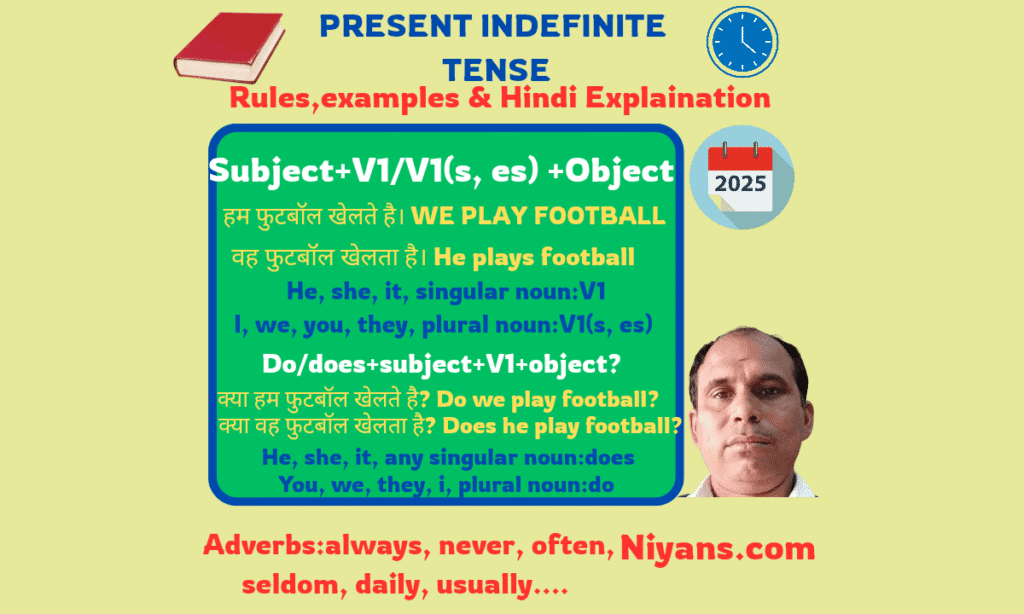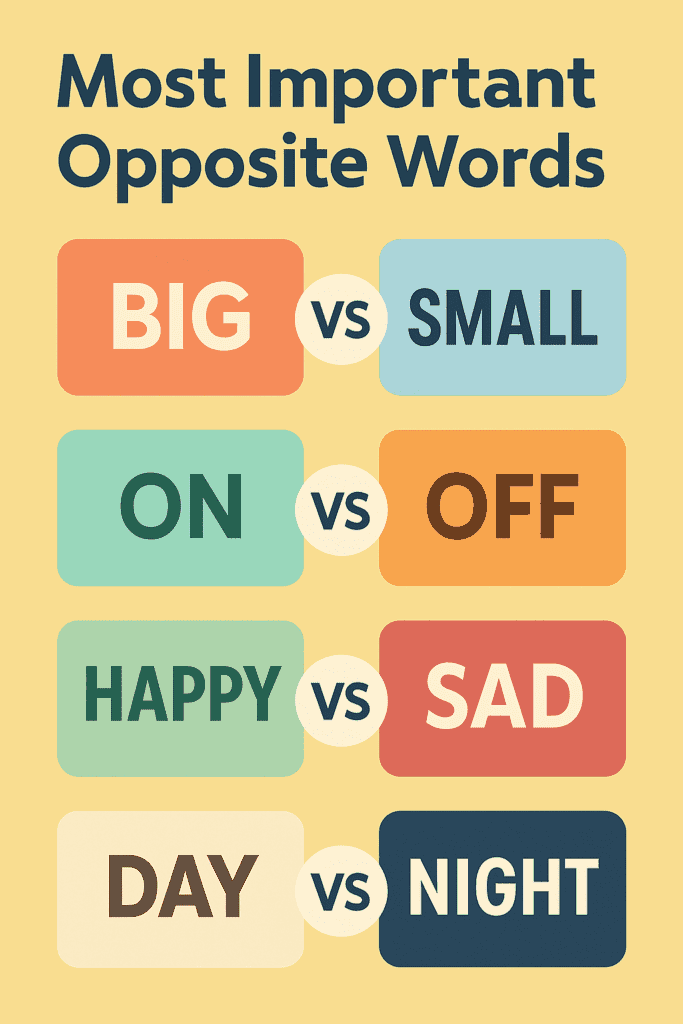What is a Verb? | Verb क्या होता है?
A verb is a word that shows action (क्रिया) or state of being (स्थिति).
Verb वह word (शब्द) होता है जो किसी काम (action) को या किसी की स्थिति (state) को बताता है।
Types of Verbs(क्रियाओं के प्रकार)
Verbs are of two types :-
- Main Verb 2. Auxiliary Verb.
1.Main Verb
Main Verb वह क्रिया होती है जो वाक्य में मुख्य कार्य या स्थिति को दिखाती है। इसे Principal Verb भी कहा जाता है।
Main Verbs के प्रकार (Types of Main Verbs):
1. Action Verb (क्रिया-सूचक क्रिया)
यह क्रिया किसी कार्य (काम) को दर्शाती है।
Examples:
- She writes a letter. (वह पत्र लिखती है।)
- They play cricket. (वे क्रिकेट खेलते हैं।)
Action verbs are of two types:
1. Transitive Verb (जिसके बाद object आता है)
A transitive verb is a verb that needs an object to complete its meaning.
Without an object, the sentence feels incomplete.
Hindi Meaning:
सकर्मक क्रिया वह होती है जो अपने कार्य को पूरा करने के लिए कर्म (object) पर निर्भर करती है।
Examples:
1.She writes a letter.
(क्या लिखती है? → a letter = object)
→ “writes” is a transitive verb.
2.He bought a car.
(क्या खरीदी? → a car = object)
→ “bought” is transitive.
3.I love my country.
(किसे प्यार करता हूँ? → my country)
→ “love” is transitive.
How to Identify a Transitive Verb?
Ask “What?” or “Whom?” after the verb.
He plays… → What? → football
Transitive
She found… → What? → her pen
Transitive
2.Intransitive Verb (जिसके बाद object नहीं आता)
An intransitive verb is a verb that does NOT take an object.
इसका काम बिना object के पूरा हो जाता है।
Hindi Meaning:
अकर्मक क्रिया वह होती है जो किसी object पर कार्य नहीं करती।
वाक्य में कर्म (object) की आवश्यकता नहीं होती।
Examples:
He sleeps peacefully.
(क्या सोता है? → कोई object नहीं)
“sleeps” = intransitive
Birds fly in the sky.
(क्या उड़ते हैं? → बस उड़ते हैं, कोई object नहीं)
“fly” = intransitive
She cried loudly.
(क्या रोई? → object नहीं है)
“cried” = intransitive
How to Identify Intransitive Verb?
Try asking “what?” or “whom?” after the verb:
He runs. → runs what? कोई जवाब नहीं
Intransitive
She sings. → sings what? कोई object नहीं
Intransitive
Examples Table:
Sentence | Verb | Object? | Type | Hindi Translation |
The baby sleeps. | sleeps | None | Intransitive | बच्चा सोता है। |
Birds fly in the sky. | fly | None | Intransitive | पक्षी आसमान में उड़ते हैं। |
She laughs loudly. | laughs | None | Intransitive | वह ज़ोर से हँसती है। |
Comparison: Transitive vs Intransitive
Feature | Transitive Verb | Intransitive Verb |
Needs Object? | Yes | No |
Ask what/whom? | Gets an answer | No answer |
Example | She reads a book. | She sleeps. |
Hindi | सकर्मक क्रिया | अकर्मक क्रिया |
2. Linking Verb (स्थिति बताने वाली क्रिया)
यह subject को किसी state या quality से जोड़ती है, न कि कोई action दिखाती है।
Common linking verbs: is, am, are, was, were, be, been, become, seem
Examples:
- He is a doctor.
- She seems tired.
3. Stative Verb (भाव या स्थिति की क्रिया)
ये verbs किसी की भावना, भावना की स्थिति, या सोच को दर्शाते हैं, कोई physical action नहीं।
Examples:
- I know the answer.
- She likes coffee.
- He believes you.
4. Mental Verb (मानसिक क्रिया)
ये दिमाग में होने वाली क्रियाओं को दर्शाती हैं।
Examples:
- I think he is right.
- She understands the concept.
Summary in Hindi + English:
Type of Main Verb | Hindi Meaning | Example |
Action Verb | कार्य को दर्शाती है | She runs fast. |
Linking Verb | स्थिति या पहचान को जोड़ती है | He is a teacher. |
Stative Verb | भावना या स्थिति को दर्शाती है | I know the answer. |
Mental Verb | दिमाग से जुड़ी क्रिया | She believes in hard work. |
2. Auxiliary Verb (सहायक क्रिया) –
An Auxiliary Verb is a helping verb that supports the main verb in a sentence.
यह वाक्य में मुख्य क्रिया (Main Verb) की सहायता करता है — ताकि हम tense, voice, mood, या सवाल बना सकें।
Types of Auxiliary Verbs (सहायक क्रियाओं के प्रकार):
1. Primary Auxiliary Verbs (मुख्य सहायक क्रिया)
These are used to form tenses, questions, negatives, and voice.
There are three Main Verbs in this category:
Verb | Forms | Use / प्रयोग |
1.Be | is, am, are, was, were, be, being, been | Continuous tense, passive voice |
2.Have | have, has, had | Perfect tense |
3.Do | do, does, did | Interrogative, Negative, Emphatic |
Examples:
- She is writing a letter. (Present Continuous)
- I have finished my work. (Present Perfect)
- Do you speak English? (Question)
2. Modal Auxiliary Verbs (मूड दर्शाने वाली सहायक क्रिया)
These show possibility, ability, permission, obligation, etc.
इन्हें हम “Modals” भी कहते हैं।
Common Modals:
can, could, may, might, will, would, shall, should, must, ought to, need, dare
Examples:
- He can swim. (Ability)
- You must obey the rules. (Obligation)
- May I come in? (Permission)
- It might rain today. (Possibility)
Differences between Primary & Modal Auxiliaries:
Feature | Primary Auxiliary Verb | Modal Auxiliary Verb |
Used with main verb? | Yes | Yes |
Can act as main verb too? | Sometimes (e.g., “I am happy.”) | No |
Indicates tense? | Yes | No (It shows mood, not tense) |
Examples | is, have, do | can, may, must, should, will |
Note:-
Some verbs like “is” or “has” can be both:
- Auxiliary Verb → She is reading (helping “reading”)
- Linking/Main Verb → She is happy (showing state, not helping any other verb)
What Are Regular and Irregular Verbs?
1. Regular Verbs (नियमित क्रियाएँ)
Regular verbs are those which form their past tense and past participle by adding -ed or -d to the base form.
Rule:
Base Verb + ed / d = Past & Past Participle
Examples:
Base Verb | Past Tense | Past Participle | Hindi Meaning |
walk | walked | walked | चलना |
play | played | played | खेलना |
open | opened | opened | खोलना |
These follow a fixed rule, that’s why they’re called Regular.
2. Irregular Verbs (अनियमित क्रियाएँ)
Irregular verbs are those which do NOT follow the -ed rule.
Their past tense and past participle forms change unpredictably.
No fixed rule → learn by memory
Irregular Verbs Table
Irregular Verb | Hindi Pronunciation | Hindi Meaning | 2nd Form | 3rd Form |
go | गो | जाना | went | gone |
come | कम | आना | came | come |
eat | ईट | खाना | ate | eaten |
write | राइट | लिखना | wrote | written |
see | सी | देखना | saw | seen |
give | गिव | देना | gave | given |
take | टेक | लेना | took | taken |
break | ब्रेक | तोड़ना | broke | broken |
speak | स्पीक | बोलना | spoke | spoken |
drink | ड्रिंक | पीना | drank | drunk |
drive | ड्राइव | गाड़ी चलाना | drove | driven |
sing | सिंग | गाना | sang | sung |
run | रन | दौड़ना | ran | run |
buy | बाय | खरीदना | bought | bought |
think | थिंक | सोचना | thought | thought |
catch | कैच | पकड़ना | caught | caught |
sleep | स्लीप | सोना | slept | slept |
make | मेक | बनाना | made | made |
get | गेट | पाना / प्राप्त करना | got | got/gotten |
begin | बिगिन | शुरू करना | began | begun |
wear | वेयर | पहनना | wore | worn |
win | विन | जीतना | won | won |
lose | लूज़ | हारना / खोना | lost | lost |
build | बिल्ड | निर्माण करना | built | built |
teach | टीच | सिखाना / पढ़ाना | taught | taught |
tell | टेल | बताना | told | told |
hold | होल्ड | पकड़ना | held | held |
stand | स्टैंड | खड़ा होना | stood | stood |
sit | सिट | बैठना | sat | sat |
fall | फॉल | गिरना | fell | fallen |
forget | फॉरगेट | भूल जाना | forgot | forgotten |
forgive | फॉर्गिव | माफ करना | forgave | forgiven |
hide | हाइड | छिपाना | hid | hidden |
lie (down) | लाइ | लेटना | lay | lain |
meet | मीट | मिलना | met | met |
pay | पे | भुगतान करना | paid | paid |
sell | सेल | बेचना | sold | sold |
send | सेंड | भेजना | sent | sent |
show | शो | दिखाना | showed | shown |
rise | राइज़ | उठना / चढ़ना | rose | risen |
shine | शाइन | चमकना | shone | shone |
shoot | शूट | गोली चलाना / शूट करना | shot | shot |
smell | स्मेल | सूंघना | smelt/smelled | smelt/smelled |
spend | स्पेंड | खर्च करना | spent | spent |
steal | स्टील | चुराना | stole | stolen |
swim | स्विम | तैरना | swam | swum |
understand | अंडरस्टैंड | समझना | understood | understood |
wake | वेक | जागना | woke | woken |
blow | ब्लो | फूंक मारना / उड़ाना | blew | blown |
choose | चूज़ | चुनना | chose | chosen |
cost | कॉस्ट | कीमत होना | cost | cost |
cut | कट | काटना | cut | cut |
deal | डील | सौदा करना / व्यवहार करना | dealt | dealt |
feed | फीड | खिलाना | fed | fed |
fight | फाइट | लड़ना | fought | fought |
hang | हैंग | लटकाना / टांगना | hung | hung |
hear | हीयर | सुनना | heard | heard |
keep | कीप | रखना | kept | kept |
light | लाइट | जलाना | lit/lighted | lit/lighted |
mean | मीन | मतलब होना | meant | meant |
read | रीड | पढ़ना | read (रेड) | read (रेड) |
ride | राइड | सवारी करना | rode | ridden |
ring | रिंग | घंटी बजाना | rang | rung |
say | से | कहना | said | said |
stick | स्टिक | चिपकाना | stuck | stuck |
sweep | स्वीप | झाड़ू लगाना | swept | swept |
throw | थ्रो | फेंकना | threw | thrown |
tear | टियर | फाड़ना | tore | torn |
think | थिंक | सोचना | thought | thought |
understand | अंडरस्टैंड | समझना | understood | understood |
weep | वीप | रोना | wept | wept |
Related posts:-Number , Singular number 1 and Plural number 2 in Hindi
पोस्ट पसंद आई? शेयर करें और English सीखने वालों की मदद करें!
कोई सवाल है? नीचे कमेंट करें या हमें संपर्क करें ।


